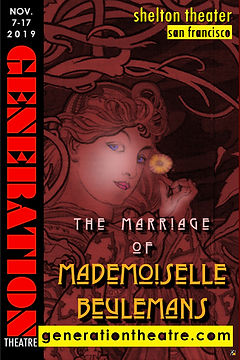the marriage of mademoiselle beulemans
by Franz Fonson & Fernand Wicheler (1910)
Translated & adapted by R. David Valayre
Directed by R. David Valayre
November 7, 8, 14 & 15 at 7:00 p.m.
November 9, 10, 16 & 17 at 2:30 p.m.
The Shelton Theater
533 Sutter St., San Francisco, CA 94102
fall 2019
Video Trailer
Dog House & Doll's House
Suzanne is the only daughter of Brussels brewer Beulemans.
Suzanne is engaged to Seraphin, the only son of Brussels brewer Meulemeester.
Albert is the only son of Parisian businessman Delpierre.
Albert is learning the brewing business as a trainee in the Beulemans brewery.
Because he is not from Brussels,
Albert's future is in the dog house.
Because she is from Brussels,
Suzanne's future is in Ibsen's Doll's House.
Will Suzanne save Albert from the dog house?
Will Albert save Suzanne from the doll's house?
__________
ALBERT:
...What you need is someone who can understand you. Someone who wakes up the subtle and the charming in you. What you need is a husband who allows you to bloom, who lets your heart progress on its journey of discovery... For you do not know yourself any better than your Seraphin knows, or will ever know, you! Have you ever seen those passive oxen that spend their days grazing the meadows and staring at passing trains? Do you think they chew the grass and spare the wild flowers? Well they don't. They uproot them, and chew them with the rest. That's how your Seraphin will have you.
SUZANNE:
And all the while, you're in the train; you watch the cattle graze, and you feel sorry the wild flowers are not for you!
ALBERT:
I pull the emergency stop and I fly to your rescue.
SUZANNE:
And then, you wear me on your lapel, and then press me in a book to let me dry with all your other memories. No, trust me: Mr. Seraphin is the right husband for me. He is simple, and he's a good man. He and I speak the same language.
(Gesture by Albert…)
I know... I'm a beautiful young soul!... I'm a delicate flower!... Well, no... You see me like that... and you decorate me with all those beautiful things you have in your imagination, and which you describe so beautifully... But I'm no botanical ornament, Mr. Albert... I'm not a flower... I'm not an elf... I'm a young woman from these parts... I am Mademoiselle Beulemans, and I am to marry Mr. Seraphin Meulemeester, because nature wants it that way: Mrs. Seraphin Meulemeester, née Beulemans! That's what my calling card will read... It's no vellum, but it's good readable print on good quality paper... Besides, Mr. Seraphin is also my parents’ choice... I can't say I feel overwhelming love for him, but I don't dislike him... He will give me peace of mind. It's more reliable than the dream of the kind of passion you read about in novels, and from which one wakes up all bruised and battered. Please, Mr. Albert, stop forcing such happiness on me... I don't deserve it more than the rest of the world... And tell me, is the rest of the world happy?
CAST & CREW
Translation, Adaptation & Direction
R. David Valayre
With
Alan Badger
Mr. Beulemans
Abhishek Das
Albert
Fabien Ferhani
Seraphin
Lynne Hollander
Mrs. Meulemeester
Nastassia Maltsava
Suzanne
Karen Sellinger
Mrs. Beulemans
R. David Valayre
Mr. Delpierre
Vishalini Mona Vimal
Isabelle
Ket Watters
Mr. Mostinckx
Lights
Katrina van Winkle
Sound
Jonathan Loo
Production Consultant,
Costume Design & Makeup
Vishalini Mona Vimal
Photos & Video
David Wilson
A GenerationTheatre Presentation
__________
The Belgian Success That Gave Birth to a French Classic
Marcel Pagnol is one of the most celebrated French playwrights of the 20th Century. His best-known comedies, worldwide, include his "Marseilles Trilogy" [Marius (1929), Fanny (1931), and César (1946)]. In 1960, Pagnol acknowledged his debt of gratitude to Fonson and Wicheler as follows:
"Around 1925, because I felt exiled in Paris I realized that I loved Marseilles and I wanted to express this love by writing a Marseilles play. My friends and my family dissuaded me from it: they told me that a play so localized, that put on show characters with such a particular accent, would certainly not be understood outside of Bouches-du-Rhône, and that in Marseilles itself it would be considered an amateur work. These arguments seemed sound and I gave up on my project. But in 1926 I saw Le Mariage de mademoiselle Beulemans; this masterpiece was already 16 years old and its success had gone around the world.
That night, I realized that a local, but profoundly sincere and authentic play could sometimes have a place in the literary heritage of a country and appeal to the whole world. So I tried to do for Marseilles what Fonson and Wicheler had done for Brussels, and that's how a Belgian brewer gave birth to [the character of] César and how the charming mademoiselle Beulemans, at 17 years old, brought Marius into the world. There is also another character who owes his life to the Brussels comedy: Monsieur Brun who is, ironically, the illegitimate son of the Parisian Albert Delpierre. I had noticed that his accent made a pleasant contrast to that of the Beulemans family and highlighted the Brussels flavor of the play. That's why, in César's Marseilles bar, I placed a man from Lyon."
Marcel Pagnol
___________
Source: Cinematek

